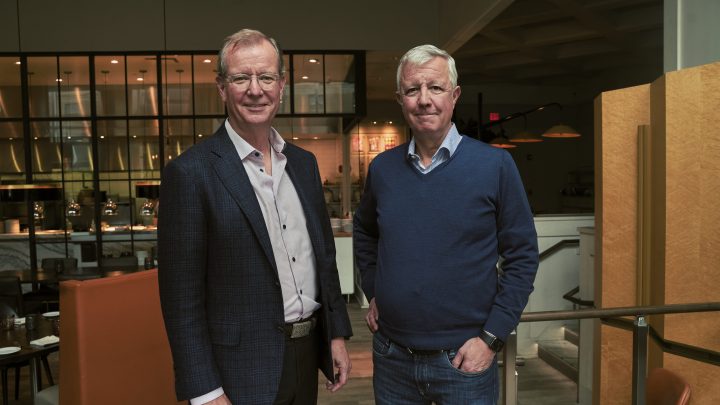
Rebooting a multibillion-dollar business after tens of thousands of layoffs
Rebooting a multibillion-dollar business after tens of thousands of layoffs


In 2015, brothers Jerry, Lou and Charlie Jacobs were named co-CEOs of the global hospitality company Delaware North. Their grandfather started the Buffalo-based business in 1915. Today, Delaware North operates food and retail at dozens of airports and sports venues, as well as some national and state parks. The company also owns hotels, casinos and restaurants.
“We started 2019 with about 48,000 people on the payroll,” Jerry Jacobs told “Marketplace” host Kai Ryssdal. “At the peak of the pandemic, we had 900.”
Except for airports, all of Delaware North’s subsidiaries shut down during the early days of the pandemic. As the economy picked back up, Delaware North had to hire back tens of thousands of employees.
“It wasn’t easy,” Jerry Jacobs said. “When we opened up, not only were we facing the difficulty of getting them back, but they were actually in jobs that were in many ways more appealing to them than working in a restaurant, where your hours are set.”
“Obviously, you’re going to have to pay market wages and then some,” said Lou Jacobs.
In the Buffalo area, Delaware North has raised nontipped hourly wages an average of 22% compared to 2019 levels.
Ryssdal and the Jacobs brothers walked from Patina 250, a restaurant in the Westin hotel that’s attached to Delaware North’s corporate headquarters, down to the kitchen. There they met executive chef Evan Wargo. The kitchen is fully staffed, with people working from about 6 a.m. to midnight. The following is an edited transcript of the conversation among Ryssdal, Wargo and Jerry and Lou Jacobs.
Kai Ryssdal: Are you having to give people raises?
Evan Wargo: Yeah, definitely. I would say coming out of the pandemic, the hourly rate has risen quite a bit.
Ryssdal: Like how much?
Wargo: Line cooks pre-pandemic were maybe going for, like, $16 an hour. And now they’re like, $17, $18, some $19 if they’re more experienced.
Ryssdal: If I say “inflation” to you, what do you say?
Wargo: Challenging. The cost of goods has gone up considerably. And the margins are already supernarrow for a restaurant. So it makes it very difficult to operate. Not impossible, but we have to watch every little ingredient that comes in and out of this place. We just have to manage everything much tighter.

Ryssdal: What’s the biggest challenge for you, inflation or labor and workforce?
Wargo: Inflation. The cost of goods is the most challenging aspect to manage because I can’t exactly control the cost of goods. I can control how I schedule people. I use fryer oil as an example. Pre-pandemic, it was $35 for 35 pounds. At the peak, it was $90. So I can’t even imagine some of the smaller restaurants, how they made it through that.
Ryssdal: Right. Let me get the bosses back in here. Thank you very much, Evan. I really appreciate your time. What do you think of what he was just saying?
Jerry Jacobs: I think he’s spot on when you’re talking about inflation in particular. And what Chef does so well — and what many in our organization do so well — is you don’t necessarily have to pass on all the costs to your customer if you can manage your menu properly, if you can work with ingredients, you know, work with portioning. And that’s what they do. And that’s where the skill really lies.
Ryssdal: Let me ask you guys the same question I asked him. Your biggest concern: inflation or labor force, Lou?
Lou Jacobs: I’d say the same: inflation. You know, it’s ongoing. It’s every day. The agility required, the flexibility required — it’s keeping everybody on their toes.
Ryssdal: If you could get [Federal Reserve Chair] Jay Powell on the phone — which, in theory, you probably could — what would you tell him?
Lou Jacobs: I think this is an incredibly complicated problem right now. Because you know, too much [interest rate raising] can stop everything. Too little, and [inflation] is going to keep running out of control. So I think that’s the biggest question out there right now.
Ryssdal: Do you tell him to take a little pause and see how things are going?
Lou Jacobs: I think they keep going until they see this thing really slow down.
Jerry Jacobs: I think we’ve got to stop this train. It’s rolling out of control right now.
Clarification (Nov. 1, 2022): This story has been updated to include Charlie Jacobs as co-CEO of Delaware North.
There’s a lot happening in the world. Through it all, Marketplace is here for you.
You rely on Marketplace to break down the world’s events and tell you how it affects you in a fact-based, approachable way. We rely on your financial support to keep making that possible.
Your donation today powers the independent journalism that you rely on. For just $5/month, you can help sustain Marketplace so we can keep reporting on the things that matter to you.

















